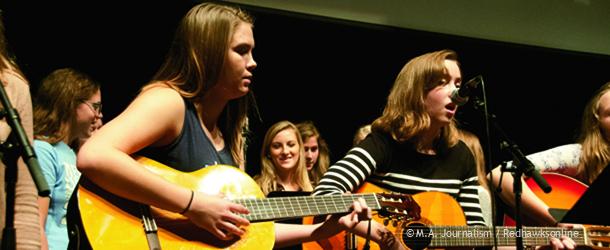Thinking, feeling, doing: how do you experience spirituality?
The search for wholeness may be private or public
The anatomy of faith has a structure of three main “body parts”: the head, the heart and the hands. In these parts people think, feel and act out their faith.
“The head is the intellectual, or mental, part of faith: the things we believe to be true, why we believe them to be true and how we understand,” said sacred studies teacher Jeffrey Crafton. “Then there’s the heart. That is the feeling part of faith, which is the experience we have in a relationship with God. And then there’s the hands, which I think of as the outward expression: how I treat people, the things I do and the things I don’t do.”
Faith is sometimes kept private and personal, or displayed openly and communally. People can think about it, feel it or take action with it. And like the body, those parts may work together. Unlike the body, however, many people feel a stronger pull toward one aspect of faith: the head, hands or heart. Faith is experienced in a myriad of unique ways specific to who someone is.
Sophomore Kitra Katz prefers to contemplate what she believes on her own, away from outside influences both at school and at home.
“I feel pressured to follow my friends’ beliefs because I’m sort of afraid that if I disagree with them, they might judge me for that,” Katz said. “I think about [my faith] a lot better and clearer when I’m alone. So when there’s no influences around me is when I can really think it through.”
Sometimes people keep their faith very personal and private because that’s how they’re most comfortable.
“I don’t like high church and organized religion,” said United States and AP World History teacher Elizabeth Van Pilsum. “I never felt comfortable with going to churches where they have a verse everyone is supposed to say together. My faith is personal to me and the mass kind of worship has always been weird to me. I think it’s because I didn’t grow up in a church home, so it was something extremely personal to me when it happened. So that’s how I worship.”
Along with thoughts in your head come feelings in your heart. Some people, like junior Griffin Pontius, feel close to God when alone.
“For me, if I’m on a mountain or something [snowboarding] and I’m looking down and just kind of looking around and thinking, ‘This is incredible. Like I can’t believe I’m really 11,000 feet up in the air,’ he said. “It’s just kind of a feeling that this is such a beautiful place we’ve been given.”
Others, like senior Joelle Wilson, feel most connected when leading a group of people in worship.
“When I’m onstage leading worship [is when I feel most comfortable with my faith],” Wilson said. “That’s where it’s so real, and I feel it flowing through me.”
Thoughts about faith are internalized in the head and considered privately. The heart is where the feeling begins, which can be public or private. Finally there are the hands of faith, when people take public action.
“I’m really trying to take the exemplary stance in showing them what Christianity is, not preaching it to them and shoving it down their throats,” said Wilson. “So I don’t talk about it, but I try my very best to live it.”
Along with the action of just living faith out and demonstrating it, there is also the literal action of lending a hand to those in need.
“Especially with the Cultural Field Experience international trip to the Dominican [Republic], I hadn’t really thought that deeply into my faith until the trip,” said junior Jonathan Webb. “It changed everything. It definitely helped my faith.”
Action in faith not only connects an individual to God but can connect the individual with other people.
“It does help to be more outgoing with your faith because it connects you with other people,” said junior Sarah Pope.
Even Van Pilsum, who is more comfortable with private faith, sees the value in communal faith. By being in connection with others who share the same beliefs, people can hold each other accountable.
“It is important to worship communally because you can get lazy by relying just on yourself,” said Van Pilsum.
While the parts of faith can work separately, it doesn’t mean they have to. Crafton urges people not to isolate each of those “body parts” and think, “this is all there is to faith.” But it all depends on the person.
“To individual people, even at different times and with different experiences in our lives, some of those will be more important than others,” said Crafton. “I think that all three are a part of faith, but they’re going to be experienced differently by different people and even at different times in their lives. One might be more important than the others.”
Whether someone’s faith is public or private, kept in specific parts such as the head, the heart or the hands, or even if they’re functioning all together, the reality of faith is not diminished.
“Each person is different,” said Pope. “And no matter how public or private they are with [their faith], they can still experience it to its fullest.”

